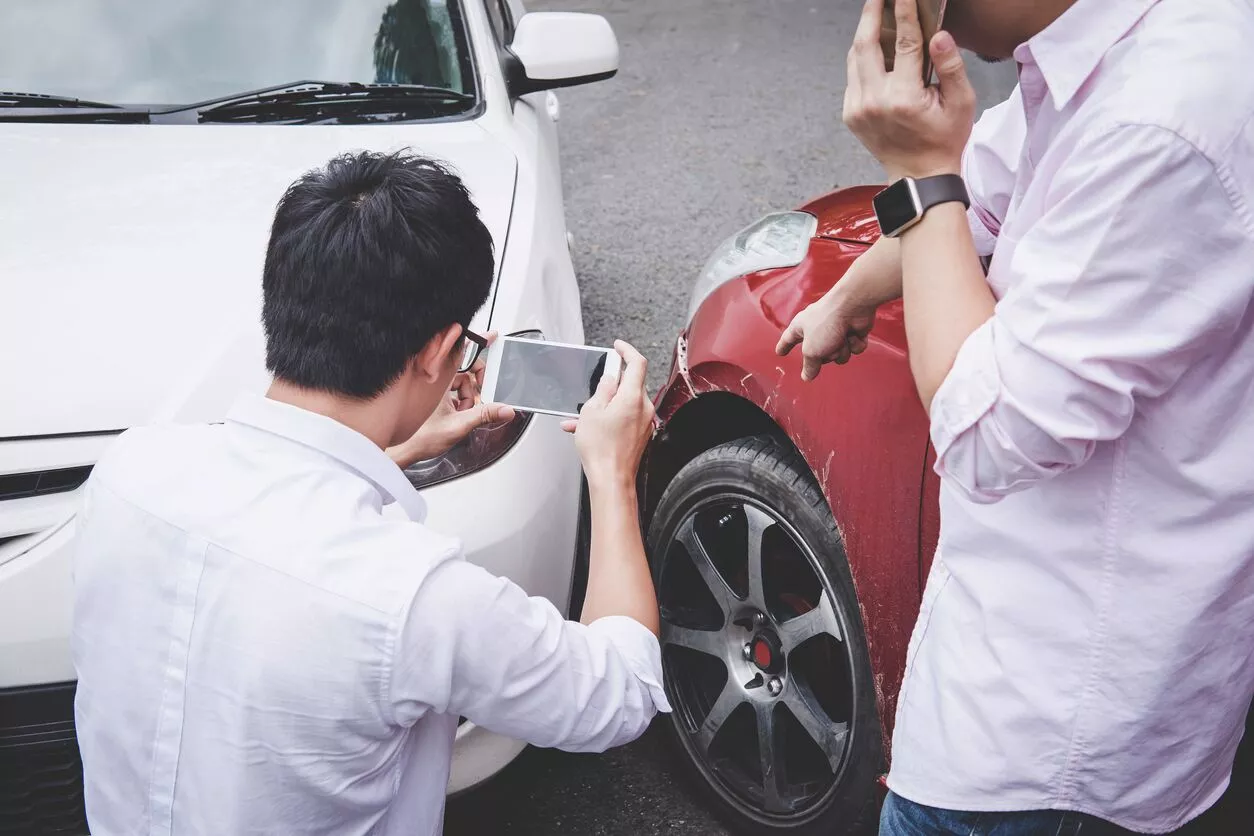7 Things to Never Do After a Car Accident
December 14, 2022 | J.L. King, II

In the best-case scenario, a car accident can leave you feeling dazed and confused. Even if you only have minor injuries, you still need to deal with the physical and mental trauma of the accident.
Car accidents are also rare occurrences for most drivers. If this is your first car accident, you may not know what to do or — just as importantly — not to do.
Learn seven things you should never do after a car accident if you want to preserve your right to injury compensation and avoid being blamed.
What Happens After a Car Accident?
After a car accident in most states, you must:
- Stop at the accident scene
- Assist anyone injured
- Exchange information with the other drivers
If the accident causes injury or death, you must report it to the police. For example, in Georgia, you must use the quickest means of communication to contact the local police or, if the accident did not happen in a city, the county sheriff or Georgia State Patrol.
The police will send officers to investigate accidents with injuries or fatalities. The investigating officers will prepare an accident report. Anyone involved in the crash can access the accident report, including:
- Drivers, passengers, pedestrians, and cyclists
- Parents of minors
- Vehicle owners
- Insurance companies
- Lawyers for anyone involved
Most states use a fault-based system of auto insurance. Under this system, drivers are required to purchase liability insurance in case of mishaps on the road.
After an accident, the liability insurer for the at-fault driver pays for losses suffered by those injured or killed. To win or settle an insurance claim, the injured party must prove the at-fault driver acted negligently in causing the crash.
7 Things to Never Do After a Car Accident
Your actions after a car accident can affect your right to recover injury compensation and determine whether you get blamed for the accident and become liable for others’ injuries.
Here are seven things to never do after a car accident.
1. Leave the Accident Scene Before the Police Arrive
Laws in every state require you to remain at the accident scene until you complete certain tasks. In most conditions, you must provide your information to the other driver. This information will typically include your name, contact information, license plate number, and insurance carrier.
If your injuries prevent you from providing your information, you may need to give your information to the police as soon as possible after the accident. The police can then include your information in the crash report.
2. Refuse to Cooperate with the Police
A good accident report can support your injury claim. You should therefore cooperate with the police to make sure the investigating officers consider your side of the story when drafting it. If you refuse, you might look like you have something to hide, and anything you say later will carry less weight.
When you speak to the police at the accident scene, stick to the facts. The police don’t need your help analyzing who caused the accident or whether they should issue any citations — they need help putting together the facts that explain what happened.
3. Apologize or Admit Fault
Anything you say in the aftermath of a crash could harm your legal interests. If you apologize or admit fault, those words might come back to haunt you when you pursue injury compensation.
Even if the facts show you played no role in causing the accident, you’ll be expected to explain your words. This could give the at-fault driver and their insurer a path for shifting blame for the accident to you.
4. Ignore Your Injuries
You might feel tempted to downplay your injuries, thinking if you get some rest, the aches and pains will disappear.
If you think there’s even the slightest chance you need to go to the emergency room, ask for an ambulance. If you have an incapacitating injury and don’t know it, you could hurt yourself or someone else by attempting to drive to the hospital on your own.
Even if you don’t think you need to go to the emergency room, it’s still a good idea to visit a clinic or private practice doctor within a few days of your crash.
Getting checked out will help you confirm that you don’t have any hidden injuries, like a concussion or internal bleeding. It will also give you the necessary documentation to prove the accident injured you.
5. Refuse Medical Treatment
Always follow your doctor’s instructions on:
- Rest
- Work restrictions
- Medication
- Physical therapy
You stand the best chance of recovery if you listen to your physician and apply their advice to the letter. You also reduce the risk that the at-fault driver will blame you for worsening your injuries by failing to take care of yourself.
If you exacerbate your injuries, an adjuster or jury might relieve the at-fault driver of paying a portion of your medical bills.
6. Talk to the At-Fault Driver’s Insurer
The adjuster will ask for a recorded statement when you file an insurance claim. In a recorded statement, the adjuster asks questions over the phone and records your answers.
This might seem harmless, but remember that the adjuster doesn’t work for you. Their job is to ensure the insurance company pays as little as possible for your claim, and they can use your words to deny or reduce your claim.
The crash report and your medical records should give the claims adjuster all the necessary facts about your accident, meaning they’ll have more than enough information to process your claim without a recorded statement.
7. Wait Too Long to File an Injury Claim
Every state has a statute of limitations establishing the deadline for filing a personal injury claim. If you miss the deadline, you most likely won’t be able to recover compensation for your injuries.
Meeting Your Needs After a Car Accident
A car accident can leave you with a stack of growing medical bills and no way to pay them. You might be forced to rely on an insurance check to pay for treatment or even cover your daily expenses. The steps you take after your accident could put you in the best position to secure payment from the insurance company and meet those needs.
The best thing you can do is to contact a team of personal injury lawyers that can help you every step of the way.
Our personal Injury Lawyer in Georgia also provides the following:
Brain injury Attorneys in Tifton, GA
Car accident Lawyer in Tifton , GA
Motorcycle Accidents in Tifton, GA
